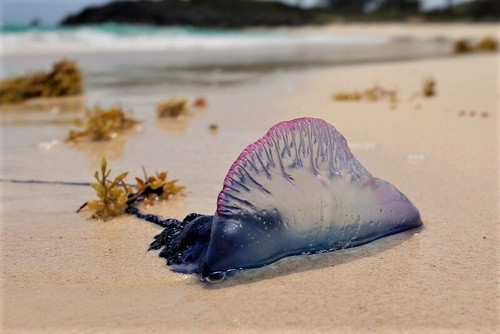Bermuda Beach Safety
Bermuda is quite safe when it comes to swimming or snorkeling from the beaches. I have rarely seen any serious beach incident in Bermuda that has ruined the vacation of a tourist. Having said that, there do exist some risks on the Bermuda beaches. With the right level of knowledge and proper measures, you can avoid such risks spoiling your party. Here are some of the Bermuda beach and ocean dangers that one should be aware of and take appropriate safety measures.
Life Guards and Beach Warnings
Lifeguards are on duty from 10am to 6pm in some of the of the public beaches during the summer months. The beaches that have lifeguard service includes Horseshoe Bay Beach, John Smiths Beach, Clearwater Beach and Turtle Beach. For Horseshoe Beach, the service is available from May 1st until October 31. For the other beaches, it starts from May 24th until the Labor day (i.e., first week of September). Daily service is available during the service period.
A white flag on the lifeguard tower indicates that a lifeguard is on duty. There are also beach warning flags that are put up. A yellow flag indicates that the water conditions are questionable and you should ask a lifeguard before getting into the water. A red flag means water condition is unsafe and you should stay away from it.
Contact (441) 236-5902 for further information about Bermuda's Lifeguard service at the beaches.
Beware of Portuguese Man of War
So what are
Portuguese Man of War? Sounds strange? Actually these unique jellyfish like marine creatures do exist in Bermuda waters and sometimes you find them on the shores as well. Portuguese Man of War has a purple-blue colored bladder that floats above the water surface. Since they look somewhat like the old Portuguese war ships, the 17th century sailors gave them such a name.
Portuguese Man of War at John Smith's Bay Beach
Photo: Peter Burka, flickr, cc by-sa 2.0
So what is the risk?
Below the bladder, they have polyps from which hang a number of long tentacles. These can be as long as 150 feet (some 50 meters). But usually the 30 feet tentacles are more common. And the stings from these tentacles can be really painful. And more importantly, they inject venom which although in most cases not fatal, can cause serious problems at times.
In some rare incidences, particularly if one has heart problems, the sting can become deadly. Depending on the quantity of the poison released, the symptoms can be different. I have heard that the toxicity or potency of the sting is almost 70% of that of a cobra venom.
However, the good news is that Portuguese Men of War are only occasionally seen. They are mostly visible during spring or early summer, particularly when a storm would have swept them towards the shore. In general they like to be in the mid sea and use their stings to kill fishes or other marine creatures.
So in all probability, you will never see them. But just in case you do, here is what you should do immediately:
Symptoms and safety measures against Portuguese Man of War
Firstly if you happen to see them, don't even try to go near them. As I said, they have long tentacles and can easily reach you faster than what you may think.
Sometimes on the beach, they might look to be dead. But they are not. So stay away.
An average sting will cause immediate pain and then itching. Remove the tentacles with a stick or by gloved hand. Rinse the wound area with salted water and apply some ice.
If itching persists, apply 1% hydrocortisone ointment 4 times a day, and 1-2 25 mg diphen-hydramine every 6 hours.
For serious problems like chest pain or breathing difficulty, you should not wait and immediately call for proper medical treatment.
Rip current can be dangerous and sometimes life threatening for the swimmers. If you know what to do in case you are caught in a rip current, you have all the chances of saving yourself. So what is Rip Current? It occurs due to a water buildup in the shore. Due to strong winds and high waves, the water is pushed into the shoreline where it sometimes starts accumulating.
And after a point, it tries to go back to the ocean ripping through a narrow channel of the sand and creating this dangerous current. If one falls into this current, one would be swept out towards the sea. But unlike undertows, the swimmer will not be pulled down under the water.
So what should a swimmer do if caught in Rip Current?
A common mistake is to swim against the current and back towards the shore. It's very difficult if not impossible to do this. The best thing to do is to float along the direction of the current or go parallel to the shore till the current dissipates. Remember, the current flows through a narrow channel, so by swimming along the shore one can come out of the channel. Once out of the influence of rip current, one should swim diagonally back towards the shore.
Sharks in Bermuda waters?
Don't panic. While there are sharks in Bermuda waters, they are generally harmless and almost never come close to the beach. I have not heard of a single shark related incidence in Bermuda in the recent years. The last one had taken place many years back and that too was a minor incidence. For detailed information, check out
Bermuda Sharks.
Well, just like many other places on the earth, if you leave your valuables unattended on a beach, you might not find them again. So, is beach theft common in Bermuda? I won't say common, but they do occur. I would recommend not to leave your camera or wallet unattended as you go for the plunge even if the beach looks deserted. Either go in turn and hand it over to someone in your group, or put all your stuff into a waterproof plastic bag and keep it with you.
|
 By Raj Bhattacharya By Raj Bhattacharya
Raj, a seasoned travel writer and Bermuda destination expert, has extensive global travel experience. This website reflects his profound insights, garnered over nearly two decades of dedicated findings and research on the island. Raj has assisted countless Bermuda-bound visitors by providing direct, personalized responses to their queries and imparting his wealth of knowledge through this platform. This site serves as an indispensable guide for those seeking informed and reliable insights into Bermuda's treasures.
|
Related Articles
1) Check out
Beach Skincare for skincare tips to protect your own and children's skin from sun damages at the Bermuda beaches.
2) Check out
Bermuda Health and Safety to understand all other areas of risks in Bermuda and the recommended mitigation measures.
|
Viewers' Reviews and Comments
Robert Hauver (February 2017)
Raj, bought your e-books and am excited to visit there and see the sites. I have a question about the safety of our belongings when swimming at the beaches. As you've mentioned, some beaches have restrooms, which I gather can be used to change into and out of swimwear. How do you keep your valuables safe while at the beaches? If both of us are in the water, no one can watch over them. Appreciate your suggestions or solution. Thanks.
Raj (bermuda-attractions.com) February 2017
Hello Bob, I would advise not to carry valuables (other than essentials) to a public beach in the first place. Having said that number of incidents of theft at Bermuda beaches are quite rare and certainly not common. In several popular public beaches like Horseshoe Bay Beach, there are lifeguards on duty who also keep a watch on any suspicious activities.
If both of you must be in water at the same time, ensure that you keep your stuff covered under a towel and make them unnoticeable. And if you need to carry valuables to the beach and want them to be absolutely safe, then choose a beach which has locker facilities such as Snorkel Park (at Royal Naval Dockyard), Tobacco Bay (at St. George) etc.
Laurie Franco (October 2015)
Hi Raj! I have searched everywhere and cannot get a concrete answer as to whether or not there are secure locker facilities at this beach. We are planning to come in May 2016 on a cruise and it will just be my husband and I. I am concerned about leaving a camera etc with our beach towels while we are swimming and am hoping to find out if there is a safe place to leave our stuff while we are in the water. I have never been to Bermuda before so any suggestions etc you may have would be greatly appreciated.
Raj (bermuda-attractions.com) October 2015
Hi, there are no safety locker facilities at Horseshoe Bay Beach, or for that matter at any beach in Bermuda. Neither I recommend keeping anything valuable unattended on the beach. So try to use a water resistant pouch or a bag and keep that with yourself unless you have someone on the beach to keep an eye on your stuffs.
Cecilia (March 2015)
Hi Raj, My family and I will be flying to Bermuda the first week of September. We are now a bit concerned because we came across an advisory issued by the US Consulate in Bermuda in 2014 advising of water contamination from raw sewage along the south shore beaches. We have not seen any updates for this advisory or been able to read online as to what has been done to improve this situation. We are travelling with 2 little kids so we are concerned about their health while swimming at Horseshoe Bay beach. Are you aware of any updates on this advisory? Are there any warning signs posted on the beach if it is unsafe to swim in? Thank you!
Raj (bermuda-attractions.com) March 2015
Hi, following the advisory issued by US Consulate in 2014, the Bermuda Ministry of Health and Environment had given a press release (on March 31, 2014) and reassured the visitors that Bermuda's beaches were safe for swimming. It was also pointed out that the US advisory was based on test results of early 2013 and that too under specific weather conditions like strong winds and wave actions. The ministry (Department of Health) had also stated that sample water testing is done from various beaches twice every week, and the department has been working towards both short and long term measures to keep the beaches safe for recreational use. That was the last I heard about the above subject. Since then, things seem to be all hunky-dory.
|

 By Raj Bhattacharya
By Raj Bhattacharya